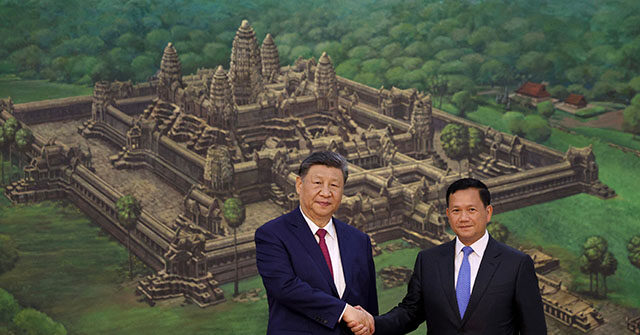Chinese Dictator Xi Jinping conducted a “charm offensive” this week, visiting Malaysia, Vietnam, and Cambodia to shore up economic alliances amid China’s trade war with the United States.
Xi told the Cambodians to “resist protectionism,” which is amusing given how heavily China’s markets are rigged against foreign businesses. The Cambodians told Xi to give them money, not advice.
“We expect more cooperation including on infrastructure development,” Cambodian Finance Ministry spokesman Meas Soksensan said ahead of Xi’s arrival. The Cambodians appear to have gotten what they were hoping for, as Chinese officials signed a billion-dollar deal in Phnom Penh on Thursday.
Soksensan was specifically referring to the Funan Techo Canal project, an ambitious undertaking that is not making much progress at the moment, and might have been a very bad idea to begin with.
The 110-mile canal is meant to link the Mekong River, near Cambodia’s capital of Phnom Penh, with the Gulf of Thailand. The goal is to make Cambodia less dependent upon Vietnam’s ports for shipping.
The canal became a symbol of Cambodian pride, and of its close relationship with China, which grew deeper as the Western world brought sanctions against Cambodia for human rights violations, including forced labor and human trafficking.
The groundbreaking ceremony for the Funan Techo Canal was timed to coincide with former Cambodian Prime Minister Hun Sen’s birthday, turning the event into a nationalist holiday and celebration of the regime. Hun Sen ruled Cambodia for 38 years and guided the canal deal with China to completion before handing over the reins to his son, Hun Manet, in 2023.
Every media outlet in Cambodia was compelled to televise every moment of the groundbreaking ceremony in August 2024 and write breathless editorials about the magnificence of the project. Hun Sen threatened legal action against any media organization that failed to use the full name of the canal when discussing it – the word “techo,” an honorific that denotes strength in battle which Hun Sen uses for himself, must always be used when speaking of the canal.
Unsurprisingly, the canal plan was not welcomed by the Vietnamese, but objections to the project go further than protecting Vietnam’s port industry. Vietnam is deeply concerned that the canal and its associated dams will drain water from the Mekong Delta, potentially damaging its indispensable rice farms.
Cambodia skipped over the consultations that could have provided a clear picture of the canal’s impact on Vietnam’s water supply, but the Stimson Center published a report in May 2024 that warned the canal has “the potential to divert water from the Mekong Basin to coastal estuaries in Cambodia outside of the Mekong Basin.”
Hun Sen’s government often touted the irrigation benefits of the canal without mentioning that those benefits might come at the expense of Vietnamese farmers. The canal could also displace up to 1.5 million Cambodian farmers who happen to live along its projected route.
The finances of the Funan Techo canal are even murkier than the water it might divert. The early stages of the project were completed quickly under the aegis of China’s Belt and Road Initiative (BRI), but it is unclear how much funding China will actually provide.
Hun Sen’s government occasionally boasted that it could finance almost all of the project on its own, but those boasts were impossible to credit and Hun Sen eventually stopped making them. Late in 2023, the Cambodian government claimed Cambodian companies would cover 51 percent of the cost and thus have majority ownership of the canal, while the rest would come from the China Road and Bridge Corporation (CRBC). CRBC was supposed to transfer its 49 percent ownership of the canal to Cambodia in 50 years, after recovering its investment.
No convincing estimate of profitability for the canal has ever been made public and the published timetable for construction was wildly unrealistic, so the notion of China paying slightly less than half the $1.7 billion cost and cheerfully handing over its shares in 2073 appears very unlikely.
Some observers believe it is possible China will foot the entire bill for the project, routing some of its money through Cambodian corporations to create the illusion of 51 percent ownership for the host country.
In addition to unveiling the long-awaited contract for the canal, China “commended” Cambodia during Xi’s visit for upholding the “one-China principle” by deporting an undisclosed number of Taiwanese citizens to China this week. The Taiwanese were arrested for operating telephone and Internet fraud centers.
Arizona State University political scientist Sophal Ear told the New York Times (NYT) on Friday that Xi’s visit to Cambodia and other Southeast Asian nations this week was “classic geopolitical theater.”
“As the U.S. scales back its footprint in Cambodia, China steps in not just to fill the vacuum, but to showcase itself as the reliable and enduring partner,” Ear said.
Read the full article here
